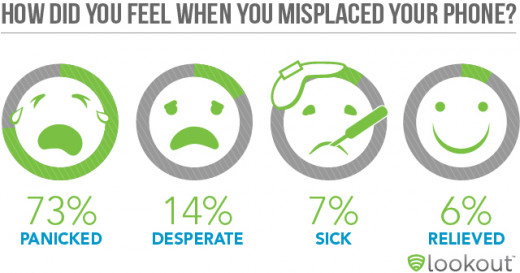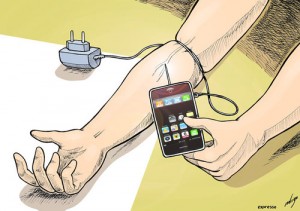The Lost Art of Conversation: How gadgets are watering down society

"Shoot, I forgot my phone"
Does anyone else find it tough to have a meaningful conversation these days? Nowadays, engaging some people is akin to pulling teeth, and I often ask myself is it even worth the hassle? It seems to me that the majority of conversations I have with people are vapid, offering nothing that is stimulating or challenging. I guess you have to find the right person to talk to but the trend towards the unimaginative and bland has become inescapable and it causes me a lot of apprehension when trying to meet new people. I may come off sounding pessimistic, but that's not the truth. Actually, I think we're the most interesting and beautiful creatures on the planet that can offer up a lot to each other. It's amazing to think about the magnitude and scope of this planet and the multitude of different cultures that live off it. The world is a lot bigger than Quincy, MA and sometimes I ignore that axiom. The idea I'm trying to accentuate is that the more we learn about different people, the more insightful our conversations will be. Think about it. If your behavior and speech is affected, how are you supposed to empathize with people that are out of "your" realm of normalcy? Our obsession with electronics is augmenting a dissociation with one another, and that has become detrimental to cool and interesting conversation topics. Did you see Justin Bieber was arrested for egging some dude's house? Yeah, cool story bro! Here's the problem: as interesting as the arrest of a Canadian pop-star is, this is a ridiculously frivolous story that has been recycled by millions of other people. Why not come up with something more imaginative and profound to talk about? We are essentially subjugated by the very devices designed to foster freedom and growth. The bleak and banal have become pervasive in our chitchats. We must learn to put down our Galaxy's and IPhone's once in a while and try reading some sort of piece of literature. The more you read and comprehend, the more you bring to the table in a conversation.

"But, they're practical?..."
Now, I'm not trying to come off as some whiny curmudgeon that tries to serve as an apologist for my peers. That's not the aim of this article and that's not how I really feel. I truly do believe if we spent less time on our gadgets, the door for conversation would swing open. We'd be forced to come up with something half-interesting to talk about. The greatest conversation killer in modern history goes to the smart-phone, in my opinion. "Hey, I have a smart phone. What's wrong with them?" The answer: nothing at all. The problem lies in the way users have become enthralled with the gadget; not the actual phone itself. The smart-phone is like a double-edged sword, if you will. It's both a blessing and a curse simultaneously. It's no secret that these gadgets have made life more convenient for both the public and private sector, and that's all well and good. I can't and won't argue against the efficiency and practically of these incredible devices. If you feel like I'm browbeating you from purchasing a smart phone, you're missing my point. I myself have just become an IPhone user but I don't let it consume my life. Productive apps like Luminosity, Duolingo, Bible, History Channel, Kindle, and things of that nature litter my interface. There's absolutely nothing wrong with gadgets if you use it the right way; the real problem lies with the owner. This misuse of technology is analogous to the phrase, "Don't blame the dog, blame the owner." It's not the machines fault that you spend countless hours unproductively. I'll leave you with an innuendo in the form of a quote to simply understand what I'm trying to convey here. "A fool sees not the same tree that a wise man sees", William Blake.

But...
That being said, I think they're contributing to the watering down of society. The trend towards immediacy has replaced the not-so-novel concept of thought and expounding on ideas. In other words, why think about it when it's right there in front of me? Should I be picking on smart-phones or is there a larger societal problem that's causing us to drift away from actual interpersonal communication? The decline in newspaper readership is definitely a contributing factor to the lack of substance in many peoples conversations. In depth stories by accredited journalists are far more favorable than a 250 word blog written by some hack. The reason I bring up the newspaper industry in the context of gadgets is because most of us that are on the move are content with receiving these specious reports and updates that come from blogging or gossip websites. Perhaps it's because the stories in print look too long for people to read and I get that. But there's so much exposition in those pieces that these other mediums can't provide you with. This is why I'm disappointed the newspaper industry is dying out because they are so important to the art of conversation...
This video pretty much says it all

Online vs. Print
The focus is now on online media rather than print and it's causing many newspaper companies to go out of business and stop the presses. Proponents for the usage of online newspapers and such would argue that the same people that stopped buying the morning newspaper have simply made the transition to digital. I would argue that many people actually prefer the dead tree edition and like the tangible qualities of a printed newspaper.
Perhaps people just aren't subscribing to online papers and are content with headlines and snippets of news as opposed to a full in-depth article. How can you have an opinion on something if you don't know the whole story? I'm starting to get the feeling that conversation has become too innocuous and people are afraid to have an opinion and speak on hot-button issues. We must learn to look each other in the eye and actually try to have a real conversation about something rather than just check our phones for the popular opinion, and then pass it off as our own. Willingness and preparation are the two important points to remember when striking up your next conversation. Oh wait, how long have you been reading this? You should probably check your phone...








